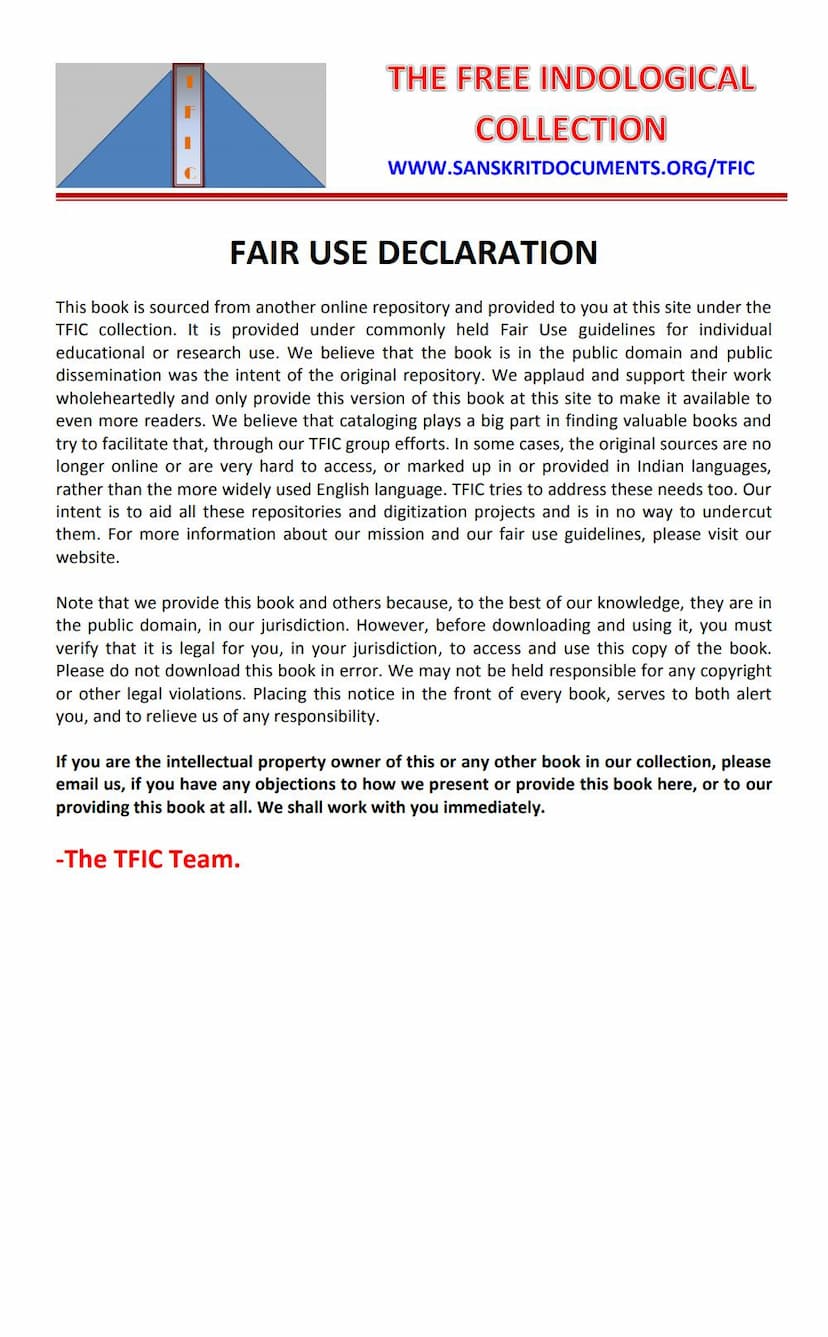Jain Siddhanta Sutra
Added to library: September 2, 2025

Summary
The book "Jain Siddhanta Sutra" by Bra. Ku. Kaushal, published by Shri 108 Acharyaratna Deshbhushan Ji Maharaj Trust, Delhi, is a foundational text that aims to elucidate the core principles of Jain philosophy in a structured question-and-answer format. The book is presented as an accessible introduction to complex Jain doctrines, designed for those seeking to understand the eternal truths of Jina's teachings.
Key Aspects and Content:
-
Author and Patronage: Authored by Brahmacharini Kumari Kaushal, the book is published under the auspices of the Shri 108 Acharyaratna Deshbhushan Ji Maharaj Trust, Delhi, reflecting the guidance and support of the esteemed Digambara Jain Acharya Deshbhushanji Maharaj. The publication is also recognized for the contribution of Upadhyay Shri 108 Vidyanand Ji Muni.
-
Structure and Methodology: The primary method employed is that of questions and answers, making it a comprehensive and systematic exposition of Jain Siddhanta. This approach aims to clarify even the most abstruse concepts for the reader.
-
Scope of Jain Philosophy: The book delves into various critical aspects of Jainism, covering:
- Epistemology (Praman): Discusses the means of valid knowledge (Pramana), including direct perception (Pratyaksha) and indirect knowledge (Paroksha), detailing their types and characteristics.
- Metaphysics (Dravya): Explains the fundamental substances (Dravya) of Jain philosophy – Soul (Jiva), Matter (Pudgal), Medium of Motion (Dharma), Medium of Rest (Adharma), Space (Akash), and Time (Kala). It elaborates on their characteristics (Guna) and transformations (Paryaya).
- Logic and Reasoning (Naya): Explores the concept of Naya, which refers to different perspectives or standpoints through which reality can be understood. It categorizes Nayas into Dravyanuyoga (focusing on substance) and Paryayanuyoga (focusing on qualities and states), detailing various Nayas like Naigama, Samgraha, Vyavahara, Riju Sutra, Shabda, Samabhirudha, and Evam Bhuta.
- Karma Theory: Presents a detailed explanation of the workings of karma, its types (Ghatiya and Aghatiya), their binding factors, durations, intensities, and the process of their manifestation.
- Soul's States (Bhava) and Paths of Life (Margana): Discusses the different spiritual states (Bhava) and the various categories of living beings (Margana) as per Jain cosmology and ethics.
- Ontology (Tattva): Enumerates the fundamental realities or principles (Tattva) of Jainism, including Jiva (Soul), Ajiva (Non-soul), Asrava (Influx of karma), Bandha (Bondage), Samvara (Stoppage of karma), Nirjara (Shedding of karma), and Moksha (Liberation). It also touches upon Punhya (Merit) and Papa (Demerit) as related concepts.
- Practice and Ethics: The text implicitly guides towards the path of liberation through the explanation of correct conduct and spiritual progression, culminating in the discussion of the three Jewels (Ratnatraya) – Samyagdarshan (Right Faith), Samyagjnana (Right Knowledge), and Samyagcharitra (Right Conduct) – as the means to achieve Moksha.
- Cosmology: Provides insights into the Jain understanding of the universe, its structure, and the dwelling places of different types of beings.
- Stages of Spiritual Progress (Gunasthana): Elucidates the fourteen stages of spiritual evolution that a soul undergoes on its journey towards liberation.
-
Purpose: The book aims to serve as a lighthouse for seekers of Jain principles, making the profound and scientific teachings of Jainism accessible and understandable. It emphasizes that Jainism is not rigid but scientific, grounded in logic and experience.
In essence, "Jain Siddhanta Sutra" is a didactic work that meticulously breaks down the complex philosophical framework of Jainism into digestible segments, offering a comprehensive guide for students and practitioners alike. It highlights the importance of understanding the correct meaning of terms and the nuanced philosophical viewpoints to truly grasp the essence of the teachings.